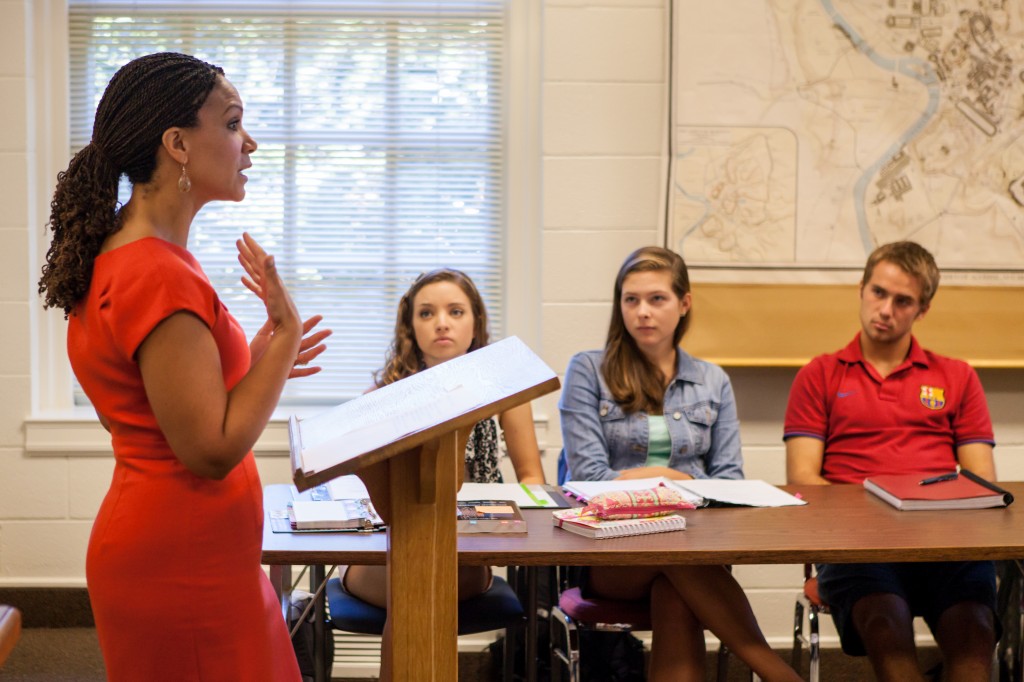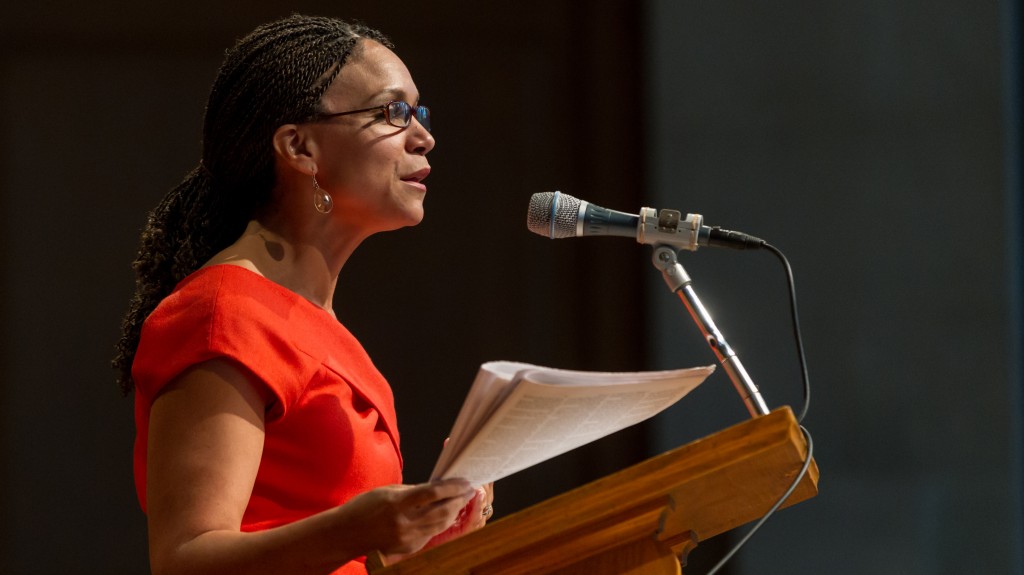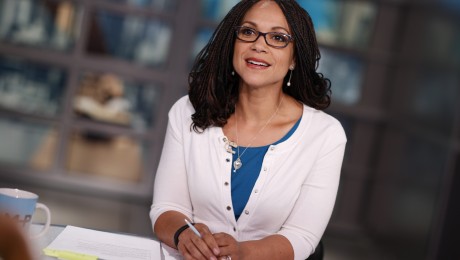Melissa Harris was just 16 years old when she enrolled at Wake Forest in 1990. Now Melissa Harris-Perry (’94), the MSNBC television host, author and educator has joined the faculty as a Presidential Chair in the politics and international affairs department.
This semester, she’s setting up the Anna Julia Cooper Project on Gender, Race and Politics in the South — which she founded at Tulane and brought with her to Wake Forest — and filling in for a colleague on maternity leave. Next semester, she plans to teach two political science classes. On weekends, she flies to New York City to host her MSNBC talk show, “Melissa Harris-Perry,” on Saturday and Sunday mornings.
In an hour-long interview in her office in Kirby Hall, Harris-Perry talked candidly about her struggles as a student and the influence of Ed Christman (’50, JD ’53) and Maya Angelou, and (on the lighter side) about close encounters with snakes, delivering pizzas around town and family trips to Disney World. Following are edited, condensed remarks.
What first attracted you as a student to Wake Forest?
The list of schools that I applied to was very short because I didn’t have a high school diploma. I had basically done all my classes and was going to be spending my senior year taking half of my classes at a community college. It seemed silly to do that rather than go on to college. Geographically, Wake was far enough to feel like it was away from home (Virginia), but close enough to get back home.
When we came (here) a couple of years ago, my daughter was with me and she had the same reaction that I had 25 years ago when I first saw Wake. Coming off Silas Creek Parkway, coming in the Reynolda Road entrance, seeing the campus as you come up the hill near Scales, and walking up on the Quad and seeing the chapel, Wake feels like “college.” It gave me that feeling from the moment that I saw it.
(Also) Wake was offering substantial financial assistance. I’m a fifth child; had I not had the financial support, there’s no way I could have done it. The final reason – and in so many ways it changed my life – I knew Maya Angelou was here. I might get to take a class with Maya Angelou.
Talk about your experience as a student.
I initially tried to reproduce the things that I had done in high school. I was on the dance team; I tried to play club soccer; I signed up to play in the orchestra because I was a cellist. Like a lot of young people, I had been the best at many things in high school, but when I got to college I discovered I was only an average dancer and a tone-deaf cellist, and although I loved soccer, I was never going to play on the varsity team. By the end of the first fall, I was in a very low place. I was very sad that I had made the wrong decision. Like a lot of kids, I was looking for my sense of belonging. That’s when I met (Chaplain) Ed Christman. He guided me through a crisis of faith in myself.
He handed me a book, “The Magnificent Defeat” (by Frederick Buechner), which I’ve read so much it’s dog-eared. I remember, and this is from Maya Angelou – you don’t remember exactly what someone says, but you remember how they made you feel – he was the first person who made me feel like I belonged here. He didn’t say it in these words, but “so what if you don’t play the cello again or are on the dance team; fine, let it die, and find your Wake Forest self.” That’s what I did. The Wake Forest Melissa really was quite different, but I had to be willing to let go of high school Melissa.

Melissa Harris-Perry (’94) speaks to a political science class during a visit to Wake Forest in 2012.
What were some of the experiences that defined the Wake Forest Melissa?
I was a founder of NIA House, a theme house for 12 or 13 African-American women, on Rosedale Circle. We wanted an experience that affirmed us as black women and felt like a safe space on campus. Whatever the ‘MHP’ show is, it’s still not as good as the in-depth level of conversations we used to have at the NIA house. The women of NIA House and Delta Sigma Theta (sorority) were the most important parts of my social life. And we had a really, really good Black Student Alliance. We thought we were very radical.
I know you were an English major. What did you want to do when you first came to Wake?
I wanted to be a novelist. When I started reading truly extraordinary literature, I realized I was never going to write like that. I’m a good, competent, capable writer, but I’m not Morrison, Faulkner, Shakespeare. I could have been a good chick-lit writer. If I couldn’t be Morrison, I didn’t want to bother.
How did your interest in political science develop?
I had a teacher, Brian Crisp, in politics, who taught a Soviet politics class, and another professor who taught a Latin America politics course, and I loved them. My definitive experience was with Kathy Smith, who taught an urban politics course, and Katy Harriger, who taught a course called leadership in a democratic society. I took that and said this is what I want to do. I never changed my major because Dolly McPherson in English was such an important influence, (as was) Maya Angelou. I knew at that point that whatever I was going to do next, I was going to employ those skills I learned as an English major but I wasn’t going to be a creative writer or go on for a Ph.D. in literature.
Who were some of your other mentors?
Herman Eure (Ph.D. ’74) in biology; Alton Pollard in religion; Willie Pearson in sociology; Anthony Parent in history. They were at the point in their careers where I am now; they were young tenured professors who had come to Wake in really tough times for black faculty members. They were so supportive of us doing all the things that we wanted to do. When we decided to occupy (then-vice president for student life) Ken Zick’s office — we were revolutionaries! — they said go for it. I look back at it now and I’m sort of nostalgic about it because it was an important learning experience.
You’ve mentioned the impact of Maya Angelou; how did your relationship begin?
In my sophomore year, I took my first course with her. I got very sick with bronchitis and had to drop three of the four courses I was taking, including – the horror! – her course. I was a scholarship student and needed a certain number of credits. She said “darling” – and this to someone who had just dropped her class – “come work for me this summer and I will help you out with your summer school tuition.” For the rest of my time here, I was her student assistant in her office.
I occasionally traveled with her, and I was at some of her famous Thanksgiving dinners. She would pitch this tent in her backyard and Oprah Winfrey and Ashford and Simpson would be there, but so would her student assistant and her hair dresser; it was literally a big tent in which everyone was welcome, with no distinctions of class or race or age or wealth or status.
How did she influence you?
In every single way. There are things that I know that I learned from her, and there are things that I just think are true, and then I realize I actually learned those things from her. I never think about any conflict between being a public person and being a professor, and that’s undoubtedly because of Dr. Angelou. It never occurred to me that it would be impossible to be both an intimate teacher in the classroom and then have big lectures out in the world, and that’s all because of Dr. Angelou.
When (Provost) Rogan (Kersh) (’86) started approaching me about the possibility of coming (to Wake Forest), I kept telling him ‘10 years from now.’ But I thought, if I go now, I’ll have more time with her, have a few more Thanksgiving dinners. She’ll help me navigate this. And then she’s just gone.
You could have a successful career as a columnist, commentator or television host, so why did you become a teacher?
My dad was a college professor, his twin brother was a college professor and my mom’s older brother is a professor. I love research; I began at research universities, first Chicago and then Princeton. I love teaching; I just think students are ridiculously fantastic and wonderfully unpredictable. Even when I teach a course like Introduction to American Politics, which I’ve taught a thousand times, every single time it’s different because the students are different. There’s nothing like 15 people, five books and 10 weeks; what happens in that setting, there’s no other kind of learning like that.
How do you engage students who hold different views from you?
I taught a large lecture course at Princeton, almost a hundred people in it; it was 2008, McCain/Obama. I had a group of guys who wore their McCain T-shirts to class every week. I loved them. Princeton, like Wake Forest, is a very civil place. No one behaved badly, but man, they challenged me. I indicate to students how excited I am about disagreements so that they will feel free to offer different viewpoints. It’s fun for me.
What do you do in your spare time?
I’m discovering that I’m the most country human on the planet. I didn’t know that because I spent my adult life living in Chicago, New Jersey and New Orleans. I showed up here and bought an acre of land. This morning, I was outside moving a fire pit, made with pavers. I was moving the pavers to my wheelbarrow to move to the barn — the last original barn in Washington Park — and there are snakes underneath it. So I got my hoe and started chopping the snakes’ heads off. I’m in the country and I’m happy!
I’m getting to know my neighbors and re-engaging with Winston-Salem and with Wake. I know this town better than anyone because I was a Domino’s Pizza delivery girl, so I know all the back streets. I couldn’t afford a car with air conditioning so I drove around with the windows down.
I’m a runner, not a very good runner, but I’ve done a couple of half marathons. We’re still travelers — despite all the commuting that I do — and we took both girls (and extended family) to Paris and Disney and Universal this summer. I come from a family of five, so family is a big deal.
We ask incoming freshmen, “What would your autobiography be titled and why?” I’ll finish by asking you that same question.
“The Struggle Continues.” From (childhood) I have (birthday) cards signed, “The Struggle Continues, Daddy.” I’m 5 years old, what does that even mean? That became a truth to me. There’s a struggle, and I’m part of it. I inherited a history and am building a present and will pass the baton to someone else. I don’t have to solve the problem, I just have to engage it. My dad meant racial struggles … but it’s true for everyone. Everyone has a legacy of struggle. You go out to move a fire pit, and there are snakes there. They don’t care who you are; they don’t watch cable TV.




